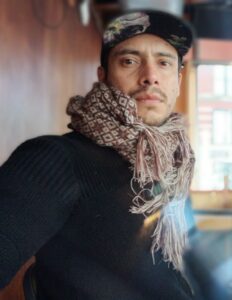In July, Dr. Emily Cummins joined the Center for Hartford Engagement and Research (CHER) as the Liberal Arts Action Lab‘s new director. Dr. Camilo Ruiz Sanchez also joined the Lab as a postdoctoral fellow. Both Emily and Camilo bring exciting skills and experience with participatory action research to the Lab. Learn more about Emily and Camilo in this blog.
Emily Cummins, Director, Liberal Arts Action Lab
 1. Where are you coming to Trinity from and what have you been working on over the past few years?
1. Where are you coming to Trinity from and what have you been working on over the past few years?
Most recently, I was a postdoctoral researcher at Boston Medical Center. I led the qualitative data collection and analysis of a CDC funded project exploring interventions for individuals experiencing non-fatal opioid overdoses. Before that, I taught at the University of Pittsburgh and I was the inaugural Kelter post-doctoral fellow in urban studies at Trinity in 2016-2018.
2. What are you most looking forward to this semester at the Liberal Arts Action Lab?
I’m looking forward to helping students learn about and engage with the city of Hartford in meaningful ways. I want students to understand critical, indigenous, anticolonialist, and feminist research paradigms can inform the work in the lab through the methods course. But I think most I’m excited about connecting students to our partners in Hartford and watching students learn from all of the resources that Hartford offers, and, in turn, give back to our community. I want to students to continue to spend time in Hartford long after they finish the lab courses.
3.What do you focus on in your research?
My own research focuses on issues of urban marginality and the ways in which cities experiencing a so called renaissance, particularly in the context of the post-industrial US, often rely on a set of discursive and material practices of future-building that work by erasing structural inequities and willfully ignoring the work that, for instance, community activists are already doing to secure more just futures. As an urban ethnographer, I learned from community actors how to push back against unjust urban policies and practices, and this informs both my research and my teaching.
4. Where is your favorite place in the world?
I love a lot of places but one place that always feels like home is a small town in rural Michigan, on Lake Huron, where I spent a lot of time as a child and always miss now that I rarely get back there
5. What are your favorite books?
This is really difficult to narrow down but one of my favorite more recent-ish novels is Salvage the Bones by Jesmyn Ward; one of my favorite ethnographies to teach is Righteous Dopefiend by Philip Bourgeois because of how much debate it generates, both in favor and in critique, about the ethics of fieldwork, and one book that really deeply inspired me while doing fieldwork is Katherine McKittrick’s Demonic Grounds.
Camilo Ruiz Sanchez, Postdoctoral Fellow, Liberal Arts Action Lab
 1. Where are you coming to Trinity from and what have you been working on over the past few years?
1. Where are you coming to Trinity from and what have you been working on over the past few years?
I come to Trinity from the University of Pittsburgh, where I finished my PhD in anthropology and a master’s in public health. In Pittsburgh, my curiosity about Rust Belt cities in the U.S. was born and I am now excited to be in Hartford to explore the post-industrial dynamics of inequality in this city. Having Trinity as my current academic nest in this new phase of my career is very exciting.
2. What are you most looking forward to this semester at the Liberal Arts Action Lab?
This semester at the LAAL I am looking forward to working together with community partners and students from Trinity and Capital Community College to solve questions posed by local community organizations. I am sure during my time at the LAAL I will be part of a powerful and diverse groups of people invested in creating more equitable and just worlds.
3.What do you focus on in your research?
My research in the U.S. focuses on Latinx immigration in new growth communities and the challenges of immigrants in their process of becoming part of the larger U.S. society with dignity. And in Colombia, where I am from, my research focuses on two main areas: 1) the experiences of heterosexual men living with HIV—an invisible population within the HIV panorama in the country. And 2) the lives of young poor men using heroin in the context of a new urban epidemic to which no structural attention has been given.
4. Where is your favorite place in the world?
This is a difficult question. I believe that places are their people, and in that sense, I can not write here all the places that I considered my favorite ones because there is not enough room to write them down here.
5. What are your favorite books?
This is another difficult one but I will list two literature pieces that had helped me to better understand the experiences of Latinx immigrants in the US which I truly recommend: The Brief Wondrous Life of Oscar Wao and the Undocumented Americans.
 1. Where are you coming to Trinity from and what have you been working on over the past few years?
1. Where are you coming to Trinity from and what have you been working on over the past few years? 1. Where are you coming to Trinity from and what have you been working on over the past few years?
1. Where are you coming to Trinity from and what have you been working on over the past few years?